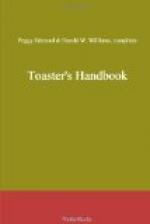“That was a two dollar bill,” he explained when he counted his change.
“I know it,” said the cashier, with a toss of her blond head. “I’m dividing with you. I saw it first.”
GRATITUDE
After O’Connell had obtained the acquittal of a horse-stealer, the thief, in the ecstasy of his gratitude, cried out, “Och, counsellor, I’ve no way here to thank your honor; but I wish’t I saw you knocked down in me own parish—wouldn’t I bring a faction to the rescue?”
Some people are never satisfied. For example, the prisoner who complained of the literature that the prison angel gave him to read.
“Nutt’n but continued stories,” he grumbled. “An I’m to be hung next Tuesday.”
It was a very hot day and a picnic had been arranged by the United Society of Lady Vegetarians.
They were comfortably seated, and waiting for the kettle to boil, when, horror of horrors! a savage bull appeared on the scene.
Immediately a wild rush was made for safety, while the raging creature pounded after one lady who, unfortunately, had a red parasol. By great good fortune she nipped over the stile before it could reach her. Then, regaining her breath, she turned round.
“Oh, you ungrateful creature!” she exclaimed. “Here have I been a vegetarian all my life. There’s gratitude for you!”
Miss PASSAY—“You have saved my life, young man. How can I repay you? How can I show my gratitude? Are you married?”
YOUNG MAN—“Yes; come and be a cook for us.”
GREAT BRITAIN
One of the stories told by Mr. Spencer Leigh Hughes in his speech in the House of Commons one night tickled everybody. It is the story of the small boy who was watching the Speaker’s procession as it wended its way through the lobby. First came the Speaker, and then the chaplain, and next the other officers.
“Who, father, is that gentleman?” said the small boy, pointing to the chaplain.
“That, my son,” said the father, “is the chaplain of the House.”
“Does he pray for the members?” asked the small boy.
The father thought a minute and then said: “No, my son; when he goes into the House he looks around and sees the members sitting there and then he prays for the country.”—Cardiff Mail.
There is a lad in Boston, the son of a well-known writer of history, who has evidently profited by such observations as he may have overheard his father utter touching certain phases of British empire-building. At any rate the boy showed a shrewd notion of the opinion not infrequently expressed in regard to the righteousness of “British occupation.” It was he who handed in the following essay on the making of a British colony:
“Africa is a British colony. I will tell you how England does it. First she gets a missionary; when the missionary has found a specially beautiful and fertile tract of country, he gets all his people round him and says: ‘Let us pray,’ and when all the eyes are shut, up goes the British flag.”




